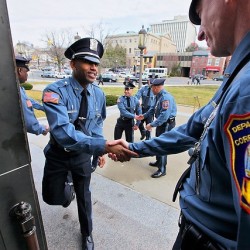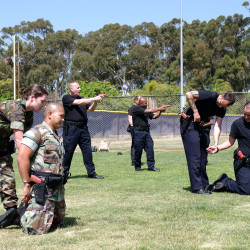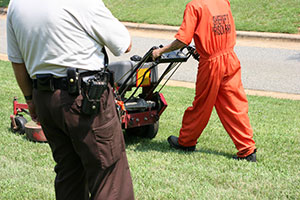What It Takes to Be a Correctional Officer
The definition of a Corrections Officer is “a person who is responsible for the supervision, safety and security of persons in prison”. That definition doesn’t really tell you much about the kind of person it takes to be an effective Corrections Officer. Is a Corrections Officer the same as being a police officer in a smaller area? Police officers do deal with dangers in their job to be sure. Those dangers are often sudden and come from out of nowhere like a motor vehicle stop. Corrections Officers know where the dangers are; they are everywhere. Each inmate is a potential life-threatening danger. And these dangers are condensed into a comparatively small area. A Corrections Officer is exposed to constant threats on a day to day basis. To understand that, you need to know what a prison is like and exactly what goes on there.
The Psychological Effects of Becoming a Prisoner or Prison Guard
In 1971 an experiment was performed about prisoners and guards. This experiment was called the Stanford Prison Experiment. The experiment was to study the psychological effects on a person if they became a prisoner or a prison guard. In this experiment 24 males were chosen to randomly be a prisoner or a guard. It took place in a mock prison setup and was for a time period of 7 to 14 days. The experiment ended after day 6 due to surprising and disturbing events. Both groups adapted to their roles so well they actually changed their behavior. Those assigned as guards were instructed not to harm any of the prisoners. The guards were each given a wooden baton to establish their status. They had uniforms and wore mirrored sunglasses to limit eye contact. The prisoners were also given attire to establish their status. They wore smocks and caps that were ill-fitting. They had a chain around one ankle. The guards were instructed to call the prisoners by the number on their smock and not by their real names. The first day went by with no incidents. Day 2 started with the prisoners rebelling and refusing to follow the guard’s instructions. Guards ended up attacking the prisoners with fire extinguishers, something not directed by the research staff. As the experiment continued some of the guards became increasingly cruel. About one third of the guards were demonstrating sadistic behavior. Prisoners were forced to sleep without mattresses and sometimes be nude to humiliate them. Sanitary conditions deteriorated as guards only let prisoners utilize a bucket in the cell for urination and defecation. To punish the prisoners, the buckets were not allowed to be emptied. Most of the guards were disappointed when the experiment came to a close earlier than expected.
The Stanford Prison Experiment is frequently referenced in academic and law enforcement circles because it provides insights into the psychology of prison life. The experiment demonstrates what can happen when the wrong personality type becomes a corrections officer, and how quickly conditions can deteriorate when people in charge do not have the tools (skills) or proper training to maintain a safe and healthy environment. This is one of the primary reasons why candidates are scrutinized so closely during the application process. Correctional officers work in conditions that demand emotional stability, mental acuity, strong interpersonal skills and strength of character- all of which are tested before a candidate is allowed into the workforce.
What Qualities are Correctional Departments Looking for?
A prison is like a city behind bars and barbed wire. The prison has medical facilities, cafeterias, recreation areas, common areas, showers and rooms for the residents. The prisoners who live in the prison have jobs they can perform if they are deemed well behaved enough to do the work without incident. Just like a city, there are groups that form a type of gang. They stick together and protect each other. They also attack members of the other groups when a threat to them has been made. The prison has inmates who are leaders, followers and loners. With all these different aspects to deal with, how does the Department of Corrections identify qualified candidates for the role a corrections officer?
Physical Fitness is Essential
An appropriate candidate that is physically fit is a must. Being able to defend oneself or others requires maintaining a high level of fitness. There will be times when restraining a prisoner is necessary to prevent injury to himself or others. The only equipment an officer will carry might be a baton. Correction Officers need to rely on themselves and not equipment to keep things under control. Being observant is another necessary trait of a good Correction Officer. Knowing what looks normal and what doesn’t. Looking for unusual behavior and illegal contraband can help keep the officer safe as well as the rest of the prison population. Inmates will manufacture weapons from anything they can get their hands on. If something is missing from somewhere, someone is using different body posture; it might be a sign of a pending attack on another inmate.
The Ability to Act Fairly and Impartially
Many times there will be inmates who seem friendlier to a Corrections Officer than others. The officer might become sympathetic to this inmate. This may cause the officer to look the other way if that inmate breaks a rule. Doing this will only cause anger amongst the rest of the inmates. This can lead to retaliation by those inmates, either against the officer or the inmate in question. A Correction Officer needs to be impartial and treat all inmates the same. Treating all the inmates impartially and fairly will create a bond of trust. One last important quality to have as a Correction Officer is to be able to communicate effectively. An officer will often have to write reports on an incident or even testify in court. Knowing how to accurately describe what occurred is essential.
Diverse Skills Are Important
It would seem like all Correction Officers should have similar traits to be considered a good officer. However, in speaking with retired Col. Thomas Davoren of the Connecticut State Police, he described how having different qualities among the officers will ensure a better force. “Just like police officers, one corrections officer is not going to be like another. Each officer will have the same basic set of skills necessary to do the job, but some may have other skills that will be beneficial to the department. To make a well-rounded force, different strengths from different officers are necessary. There are always some people who can communicate better than others. Having an officer know how to talk a situation down instead of escalating it is as important as having officers who are physically stronger than others. One officer may have an excellent memory for criminal statutes while another has excellent investigative skills. No one officer can possess all these traits. It takes a blending of each type to make an effective force.“
Understanding the Correctional Hiring Process
When investigating a potential candidate for corrections officer there are many phases of the hiring process the candidate will go through. The first phase will likely be a written test. Those scoring above an acceptable level will be invited to a physical agility test. The passing candidates will have participated in an oral board. This board will consist of supervisors in the prison and other respected correctional officers. From there, the recommended candidates will meet with the highest ranking officer for an interview and proceed with a background check. Many people feel if there is anything that pops up on your background check you will be disqualified for the position. This may not be true. A law enforcement agency is looking for someone who is honest and has integrity. Explain the indiscretion and it may not hurt your chances for the job. If the background check is successful a job offer will likely occur. The candidate will then go through a physical exam, drug testing and a psychological exam. When all phases of this process are completed and satisfactory, the candidate will begin his employment. The two opportunities a candidate has to make an impression with his superiors will be during the oral board and in any interviews. Supervisors look for a professional appearance and being well dressed. A corrections officer needs to be confident so appearing confident in the hiring process will show them you can handle yourself.
Potential Red Flags
There are several red flags that any Department of Corrections will look for when investigating a potential correctional officer. If the candidate has acquaintances in the prison system, has gang affiliations or has been arrested before they won’t be considered. Any failure of the psychological exam would be a red flag not to hire that person. Being dishonest on the background check or in an interview will be a good reason not to hire you. Frequent moving from job to job is a sign of trouble. Being turned down by other corrections agencies is another red flag.
The Importance of Appearance and Conduct
Correctional departments, like other branches of law enforcement, are para-military organizations. Appearance and conduct play an important part of the image. In order to be respected and emit an air of authority and confidence a correction officers must adhere to a strict dress code and conduct. Hair must be neat and the officer clean shaven. The uniform must be neat and clean and free of unauthorized accessories. Sloppiness and unkemptness does not portray the image of someone who cares about the job. Inmates may attempt to take advantage of an officer they feel they can push around. An officer must follow a code of conduct. This code is enforced on the job as well as off the job. The officer should use the corrections uniform for his or her own gain. Corrections Officers as well as Police Officers are held to a higher standard of conduct because of their profession. If the professionalism that is required is not adhered to the officer may be let go. A speeding ticket may not mean a janitor gets disciplined at work, but a corrections officer is expected to obey the laws.
Ten Award Winning Correctional Officers to Learn from
Janetta Williams from the Texas Juvenile Justice Department is on duty at the Ron Jackson State Juvenile Correctional Complex in Brownwood, Texas. She was the recipient of the Texas Corrections Association’s 2013 Outstanding Juvenile Corrections Line Officer of the Year Award. Williams lives in Brady, Texas and has worked in corrections since 2005. She was recognized for her exemplary work with juvenile females and her outstanding work ethic. According to Ron Jackson Superintendent, April Jameson, “Jannetta Williams takes great pride in her work and her dorm. She has an outstanding work ethic and displays loyalty and integrity on a daily basis. She is a great asset to the Ron Jackson facility and the PAWS Team, we are very fortunate to have her on our staff.” Janetta Williams is currently working with the PAWS (Pairing Achievement with Service) Dorms. The youths in this program are paired with a shelter dog. The dogs are cared for and trained in appropriate behavior to ready them for adoption while the youths learn responsibility, empathy and caring. She listens to the youths with interest and sets out to come up with solutions to their problems. Williams’ coworkers describe her as firm, consistent and fair with the youths she works with. She always puts safety and security first.
Sgt. Master Ray Martin of the Rayburn Correctional Center was named Louisiana’s Department of Corrections Officer of the Year in 2011. Martin began his career in corrections in 1987. The award for Corrections Officer of the Year was given to Martin because of an event that occurred in May 2011. He was “shaking down” a locker of an inmate and found written, detailed instructions on manufacturing methamphetamine in a letter. “It was an eye-opener since most of the common ingredients involved are available to offenders,” said Warden Robert Tanner. The letter led prison investigators to several prisoners who possessed the illegal drug. Sgt. Master Martin also found “Mojo” in a hidden compartment in a coffee pot of an inmate. He asked to be part of the elite investigative team and was instrumental in locating more secret compartments in the prison where the drug was hidden.
Macaria Orgazan, a Corrections Officer from the California State Prison system, was recognized as Corrections Officer of the Year in 2014. She has a K-9 partner, Blue-Zen, who is a 9 ½ year old Dutch Shepherd. Together, Officer Orgazan and Blue-Zen have stopped numerous attempts of smuggling contraband into the prison. CDCR Undersecretary of Operations Martin Hoshino stated, "Last year alone, Officer Orgazan and Blu-Zen were directly involved in the seizure of approximately 88 grams of methamphetamines, 410 grams of marijuana, 49 grams of heroin and 3 grams of cocaine. And for those of you who aren't familiar with quantities, I can tell you that's a hell of a lot of dope." Officer Orgazan and Blue-Zen are also responsible for the arrests of 16 civilians trying to bring contraband into the prison. Because she works with a partner, Officer Orgazan credits their accomplishments to her partner. “I can pretty much tell if he thinks he’s on to something,” Officer Orgazan said. “I can see the changes in his behavior and so I know we need to look a little harder.” She stated that most of the finds were his. She also stated that she is not the only one working to stop illegal drugs in prison and would like to acknowledge the teamwork from the rest of her unit.
Correctional Officer Daniel Beal was named as Allegheny County Detention Center’s Officer of the Year in 2014. Officer Beal has been with the Detention Center for 6 ½ starting in July 2008. He currently covers all posts and is working the day shift. Beal is skilled at interpersonal communications with the inmates, a trait sought after by supervisors. He treats the inmates firmly, fairly and impartially. He has the ability to speak to the inmates on a level they understand without an air of disrespect. He exudes calmness and patience when dealing with inmate issues. His coworkers recognize him as a mentor who is there to help and not criticize. Beal is dependable, flexible and a very valuable asset to the facility, the Sheriff Craig Robertson said. “He sets a high standard for others to follow and we are honored to distinguish him as the Allegany County Detention Center Officer of the Year,” Robertson said.
Corrections Officer David Osborne received the Carson City Correctional Facility Officer of the Year Award. Osborne is a 27 year veteran of corrections in Michigan. Officer Osborne acknowledges that his job may not always be appealing, but he enjoys coming to work every day and is happy with his career choice. He and two other officers are in charge of 240 inmates during their shift. Osborne knows it takes all three to work together as a team to keep things together. His supervisors see him as a good trainer, teacher and mentor to the new staff. He has received many letters of commendation over his career, in addition for being recognized for his exemplary work ethic. He keeps a positive attitude and a smile on his face. He may smile, but his superiors know he is aware of the seriousness of this job. “I have always known him to be serious about his work and to find ways to do his job safely while having a positive influence on the prisoner population,” Warden Cathleen Stoddard said. “Officer Osborne has a strong work ethic and good sense of humor that is used together to get work done in a safe and meaningful way. He is attentive in observing prisoner behavior as well as listening to and communicating to the prisoner population.”
Correctional Officer Joseph Good was named Noble Corrections Institution’s Officer of the Year in 2009. He started his career with the State of Ohio in 1996 and has been a member of the NCI Special Response Team since 1997. “Officer Good is a solid professional employee with a good attitude and a calm demeanor,” said NCI Warden Ed Voorhies. “He is well respected by both staff and inmates and is an excellent officer.” The Noble Corrections Institution’s Officer of the Year award recipient is nominated by his coworkers. The most meaningful awards are from those doing the same job as you.
Cpl. Robert Bernier was named by The Maryland Correctional Administrators Association as Correctional Officer of the Year for Charles County in 2005. He received this award for his dedication to this Agency as Charles County Detention Center’s Security Maintenance Officer. "Cpl. Bernier has an excellent work ethic and he is very deserving of the MCCA's Correctional Officer of the Year award," said Capt. Tim Plumer, commander of the Corrections Division, which is responsible for the Detention Center. "He is someone I know I can always count on and he demonstrates his commitment to helping us run a top-notch facility everyday." He is in charge of the maintenance and operation of the security camera system, the electronic doors and mechanical doors. He also keeps a detailed inventory of the keys in the Detention Center. His fellow co-workers call him “Doctor Bob” or “Bob, this old Jail” due to his willingness to repair anything in the facility. He is so dedicated that many times he comes in off duty to fix something. His supervisors acknowledge that it would be impossible to calculate how much money Cpl. Bernier has saved the Detention Center if contractors had to be hired to do all the maintenance he has done.
Corrections Officer Reeshemah Taylor from Osceola County, Florida was given the Medal of Valor for her service by Vice President Joe Biden in 2013. The Medal of Valor is the highest honor America awards to public safety officers. Officer Taylor earned the award for an event in 2009. She was confronted by a very high risk inmate in the Osceola County Jail. This inmate had already taken one other corrections officer hostage. Officer Taylor rushed into the cell and when the gun was held to her head by the inmate, she wrestled it away.
Corrections Officer Gary E Erdmann, Jr. was the Cape May County Corrections Officer of the Year in 2012. Officer Erdmann was hired by the New Jersey facility in 2005. Prior to his employment in corrections, Officer Erdmann was in the United States Marine Corp for 10 years. Officer Erdmann is the Safety Officer at the Cape May County Correctional Center and certifies the staff at the facility in first aid and CPR. He was specifically acknowledged for his outstanding professional representation of the department while interacting with outside agencies and other county departments. Sheriff Gary Schaffer said, “Officer Erdmann is one of our “go to” officers when things need to be done quickly and efficiently. He focuses on the task assigned and successfully completes any assignment. He is truly an asset to this office and is to be congratulated for his hard work and dedication.”
Corrections Officer Louis C. DeBaca received his Medal of Honor 34 years after he displayed heroism on his job during the New Mexico prison riot. In 1980, inmates took over the prison facility in Sante Fe. Officer C. DeBaca rushed from his post that was outside the prison into the prison to help. He came into the control room just as the inmates were breaking through the unbreakable glass. Both Officer C. DeBaca and another officer escaped at the last moment. “As we exited, the prisoners were already in the control center hitting the switches,” DeBaca said in an interview. “As we were running out they were throwing shanks at us.” He risked his life saving the lives of other corrections officers. During the riot inmates hunted each other down. They tortured and murdered dozens of other inmates. State police and the National Guard were brought in a finally regained control. The prison was closed in 1997. Officer Louis C DeBaca believes he was only doing his job.








